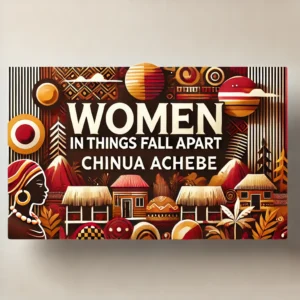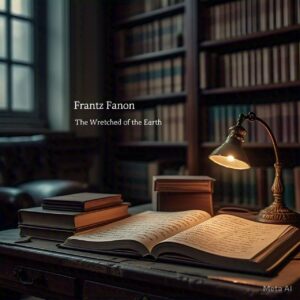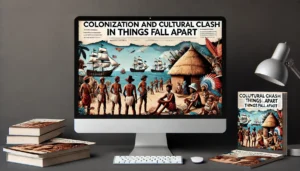Achebe’s Narrative Style in Things Fall Apart
Chinua Achebe’s Things Fall Apart is widely recognized not only for its powerful themes and portrayal of Igbo society but also for its distinctive narrative style. Achebe masterfully blends traditional African storytelling with Western literary techniques, creating a novel that remains deeply rooted in Igbo culture while being accessible to a global audience. His narrative style is characterized by third-person omniscient narration, the incorporation of Igbo oral traditions, and a unique use of the English language. These elements work together to present an authentic yet universally comprehensible account of pre-colonial Igbo society and its transformation under colonial rule.
Third-Person Omniscient Narration
Achebe employs a third-person omniscient narrator, allowing the reader to see the world through multiple perspectives. This narrative technique provides insight into the collective consciousness of the Igbo people while also delving deeply into the thoughts and emotions of individual characters, especially Okonkwo.
The omniscient narrator is neutral and does not impose Western judgments on Igbo traditions. Instead, the narration presents Igbo customs, beliefs, and conflicts as natural and logical within their cultural context. This impartial perspective is crucial because it challenges the colonial portrayal of African societies as primitive or barbaric. Achebe does not romanticize Igbo culture but presents both its strengths and flaws. For instance, the novel shows the rich traditions of justice, community governance, and religious beliefs, but it also critiques rigid gender roles and the harsh treatment of outcasts.

By using an omniscient perspective, Achebe also highlights the inner conflicts of characters. Okonkwo, for example, struggles between his personal fears and societal expectations. The narrator reveals his deep-seated anxiety about being perceived as weak, stemming from his father’s failures. This internal conflict drives much of his aggressive behavior and ultimately leads to his downfall.
Incorporation of Igbo Oral Traditions
A key feature of Achebe’s narrative style is his incorporation of Igbo oral traditions, which include proverbs, folktales, and rituals. These elements give the novel an authentic African voice and connect it to the storytelling traditions of the Igbo people.
- Proverbs as a Reflection of Igbo Wisdom
Proverbs are deeply embedded in Igbo culture, serving as a way to convey wisdom and social values. Achebe integrates numerous proverbs into the narrative, reinforcing the richness of Igbo speech and thought. For example, the saying “Proverbs are the palm oil with which words are eaten” emphasizes the importance of eloquence and communication in Igbo society. - Folktales and Cultural Morality
Achebe also weaves folktales into the novel, often using them to highlight moral lessons and cultural values. A notable example is the tale of the tortoise and the birds, which Nwoye’s mother tells to the children. This story, about a cunning tortoise who deceives the birds and is ultimately punished, reflects Igbo beliefs about greed, deception, and justice. The inclusion of such stories highlights the oral transmission of cultural knowledge and serves as a contrast to the written texts introduced by the Europeans. - Rituals and Ceremonies
The novel also vividly describes Igbo rituals, such as communal decision-making, religious ceremonies, and justice systems. The trial scene in the village ilo (public square) showcases the Igbo legal system, which is based on dialogue and consensus rather than authoritarian rule. Such depictions provide a counter-narrative to colonial portrayals of Africa as lawless or uncivilized.
By embedding these oral traditions into the novel’s structure, Achebe ensures that Igbo culture is not just described but experienced by the reader. This narrative approach affirms the value of African storytelling traditions within a literary form that had traditionally been dominated by Western perspectives.
Use of English and Linguistic Hybridization
Achebe’s decision to write Things Fall Apart in English was a deliberate and strategic choice. While English was the language of the colonizers, Achebe transforms it into a tool for representing African voices and experiences.
- Igbo Words and Expressions
Achebe integrates Igbo words and phrases directly into the English text, preserving the authenticity of the cultural setting. Words like chi (personal god), egwugwu (ancestral spirit), and obi (hut) remain untranslated, allowing the reader to engage with the language and worldview of the Igbo people. The lack of direct translation forces non-Igbo readers to encounter the novel on its own cultural terms rather than through a Western lens. - Rhythmic and Oral Influence on English Prose
Achebe’s English prose often mirrors the rhythm of Igbo speech patterns, incorporating repetitions and direct speech. The dialogue between characters maintains an oral quality, reflecting the conversational nature of Igbo storytelling. For instance, characters often repeat key ideas for emphasis, just as they would in oral tradition. - Contrast Between Igbo and Colonial Language
Achebe also uses language to highlight cultural tensions. The missionaries and colonial administrators speak in formal, detached English, contrasting with the fluid and expressive speech of the Igbo people. This linguistic divide underscores the cultural misunderstandings and conflicts that arise between the two groups.
By blending English with Igbo linguistic structures, Achebe creates a hybrid literary style that bridges African and Western literary traditions. This approach challenges the dominance of European languages while demonstrating that African narratives can exist within the framework of global literature.
Conclusion
Achebe’s narrative style in Things Fall Apart is a powerful fusion of third-person omniscient narration, Igbo oral traditions, and linguistic hybridization. His impartial yet deeply immersive storytelling allows readers to engage with Igbo society from within, rather than through an outsider’s perspective. By integrating proverbs, folktales, and Igbo customs, Achebe preserves the oral traditions of his people while adapting them to the novel form. His use of English, infused with Igbo expressions and rhythms, creates a distinct voice that asserts the legitimacy of African literature in the global literary canon.
Ultimately, Achebe’s narrative technique serves his larger goal: to reclaim the African story from colonial distortions and present it on its own terms. Things Fall Apart is not just a novel about cultural change—it is a literary act of resistance, proving that African storytelling traditions can thrive within and reshape the English language itself.
#Narrative Style in Things Fall Apart #Narrative Style in Things Fall Apart #Narrative Style in Things Fall Apart #Narrative Style in Things Fall Apart #Narrative Style in Things Fall Apart #Narrative Style in Things Fall Apart #Narrative Style in Things Fall Apart #Narrative Style in Things Fall Apart #Narrative Style in Things Fall Apart #Narrative Style in Things Fall Apart #Narrative Style in Things Fall Apart #Narrative Style in Things Fall Apart #Narrative Style in Things Fall Apart #Narrative Style in Things Fall Apart #Narrative Style in Things Fall Apart #Narrative Style in Things Fall Apart #Narrative Style in Things Fall Apart #Narrative Style in Things Fall Apart #Narrative Style in Things Fall Apart #Narrative Style in Things Fall Apart
Read More
Civilization and Cultural Clash in Things Fall Apart
Introduction to Things Fall Apart
Frantz Fanon’s The Wretched of the Earth
Postcolonialism and Resistance
Orientalism and The Colonizer’s Gaze and the Creation of the ‘Other
Plot Construction in Pride and Prejudice
Introduction to Fiction and Non Fiction
Of Death — Francis Bacon (Text)
Of Truth Critical Analysis by Sir Francis Bacon
Of Truth by Francis Bacon Summary
Visit Us on our Facebook Page:






